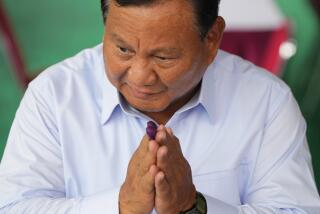Indonesia’s Leader on the Spot
- Share via
The international goodwill that Indonesia’s President Abdurraham Wahid enjoys is dissipating quickly as attacks on foreigners and refugees in West Timor multiply. Wahid, the country’s first civilian president, promised he would investigate and prosecute the military officers responsible for last year’s brutality in the now independent East Timor, but he has not delivered. Earlier this month, three U.N. relief workers stationed in refugee camps along the borders of East and West Timor and a score of civilians were murdered by rampaging militias while soldiers looked on. The international community is rightfully pressuring Wahid to rein in the military.
The evidence of the military’s involvement in violence that preceded and followed last year’s vote for independence of East Timor was overwhelming. So far, the investigation has yielded an incomplete list of 19 suspects, some of whom have since been promoted. The leader of the militias, Eurico Guterres, is not on the list.
Most Indonesians, including Wahid himself, reject international criticism of Jakarta’s failure to control its military and oppose any form of U.N. intervention--including the creation of a war crimes tribunal--as meddling in the country’s internal affairs. At the same time, Wahid is appealing for foreign financial aid and acknowledges that Indonesia’s economic recovery cannot happen without foreign capital.
He can’t have it both ways. More than 100,000 East Timorese who fled last year’s violence to West Timor are still held in border refugee camps virtually captive to pro-Jakarta militias. Foreign aid workers left the camps after last week’s violence, and U.N. peacekeepers in East Timor are not allowed to cross the border to protect the refugees. There clearly is reason for the international concern.
Wahid’s task of remaking Indonesia into a pluralistic democracy and subduing the powerful military was never going to be easy. He needs financial support and investor confidence, and he needs to be reminded that he will have to deliver more than empty promises to get such support.
Violence in the refugee camps must stop, U.N. workers must be allowed to resume humanitarian aid safely and the refugees who want to return to East Timor must be allowed to do so. Those responsible for violence must be brought to book. That’s the message U.S. Secretary of Defense William S. Cohen should deliver to Wahid when the two meet Sunday.
More to Read
Sign up for Essential California
The most important California stories and recommendations in your inbox every morning.
You may occasionally receive promotional content from the Los Angeles Times.













